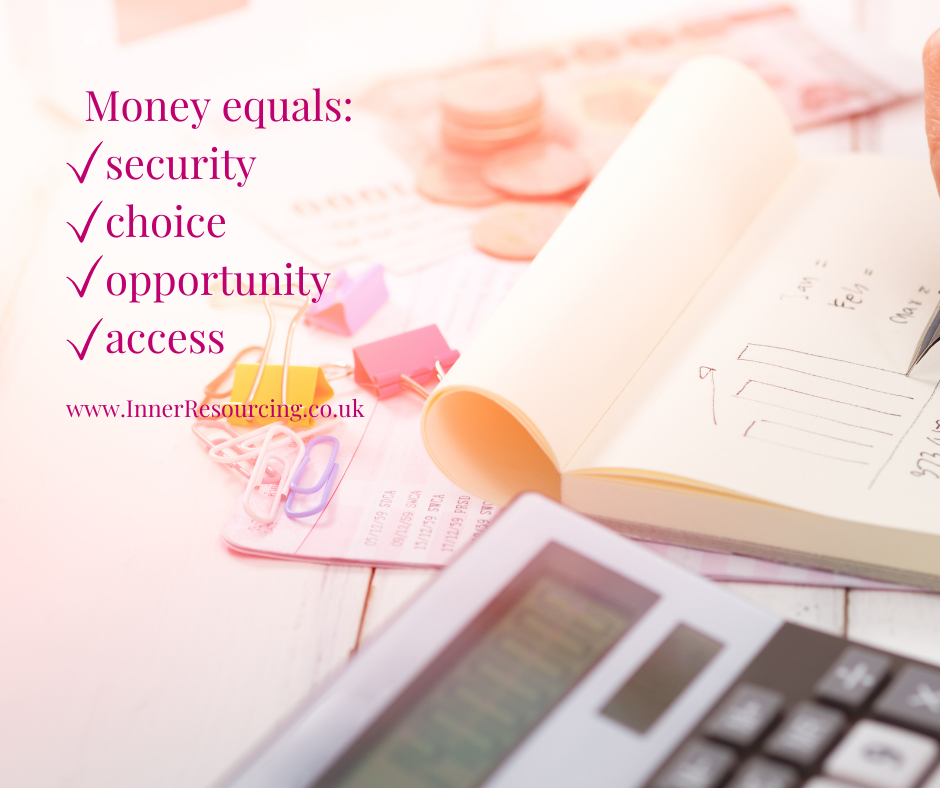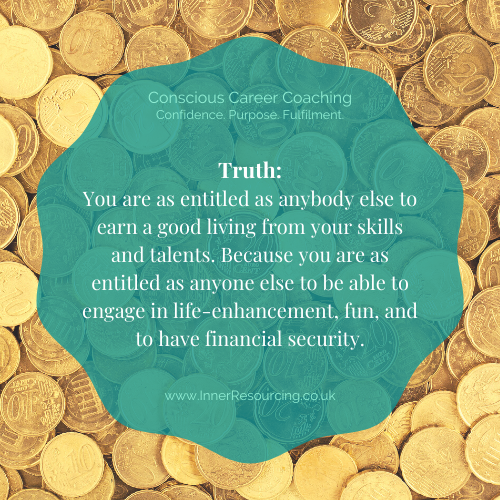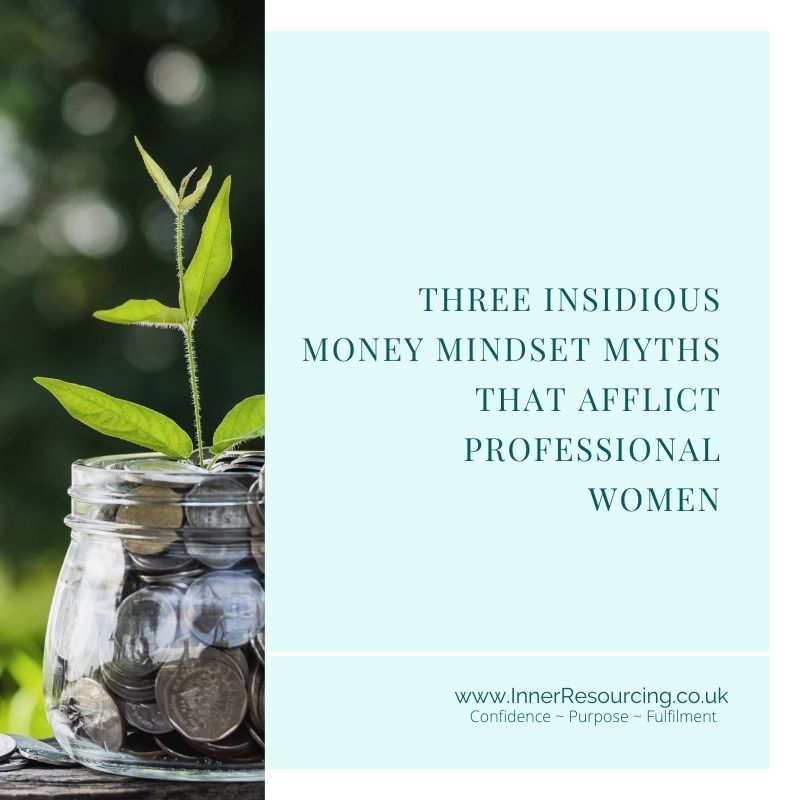3 Insidous Money Mindset Myths That Afflict Professional Women
Why is it so hard to talk about money?
Money is the basis of our modern world and none of us can live without it. We certainly can’t live the kind of fulfilled lives we want to live without financial support. Yet so many purpose-led women seem to have a problem with their money mindset…
It’s not just that they believe that “money can’t buy happiness”, it’s almost a rejection of the idea that money should be important at all.
Or maybe you DO recognise it’s important but you still feel “icky” thinking about it, or “squirmy” when it comes to talking about fees or asking for a raise?
So is this a “money mindset” issue?
“Money mindset” is too vague. Let’s get real.
These are actually issues to do with power, showing up for yourself, and creating the life you want.
I believe three money mindset myths intersect to prevent purpose-led women from accessing their financial power:
- Variations of “Money can’t buy happiness” – promoted by well-meaning folk, like your mum, as a warning about priorities. Also a statement of privilege (I’ll unpack this a bit more in a minute).
- Money isn’t “nice” and talking about it, asking for more of it, or especially, “flaunting it” isn’t nice either. (Usually comes packaged with “Women/girls should be nice.”)
- Money is power and power is dangerous and corrupting. This is, hands down, the most unacknowledged and undermining story we tell ourselves about money.
Let’s dig in to these. (See if you recognise your “money mindset” being impacted by any of this)…
Money Mindset Myth 1: Money versus Happiness
While of course, money can’t buy happiness (not sure anyone ever said it could), it facilitates the basic essentials of life, like enough to eat and a comfortable, secure place to live.
Certainly, it’s important to keep an eye on priorities and balance how we spend our time.
And yes, it is true that you can be utterly miserable, working all the hours to pay for that big house and garden that you never have time to enjoy. That ain’t fulfilment. And you might absolutely feel locked into that merry-go-round, and if you are, then please get support to change things because you almost certainly can’t untangle that one on your own.
But at the other end of the scale, when you are in poverty, you have less disposable income for life enhancing stuff, and, less time, because you have to spend more time (and cognitive load) just living.
(For example, using public transport rather than driving; working two jobs to make ends meet; going to multiple shops to get the best deals; worrying; scrimping for larger purchases, either before if you’re saving up, or after to pay off credit that costs more when you’re poor).
That doesn’t sound much like happy or thriving to me.
You need money to access and participate in many life enhancing experiences
Things like travel, learning a new skill, doing yoga/dance/creative arts, having a pet, etc., etc.
Having time for fulfilling or life enhancing activities can also cost money, eg hiring a cleaner, or a babysitter. This is particularly an issue for women, who still, STILL, do most of the household chores and most of the childcare, and, most of the cognitive load-lifting required to manage it all. 1Gender Divisions of Paid and Unpaid Work in Contemporary UK Couples by Anne McMunn, Lauren Bird, Elizabeth Webb, Amanda Sacker First Published July 25, 2019 as reported in The Independent On-line, July 26th 2019 https://www.independent.co.uk/life-style/women-men-household-chores-domestic-house-gender-norms-a9021586.html
(You knew that already, though, didn’t you?)

Money can’t buy happiness, but it can buy security, opportunity, and access.
It can buy choices. And the power to make them.
(Oh yes, power, another thing that can be hard to talk about – more about this in a minute).
Next time someone tells you “you’re too money-oriented”, or “Money won’t make you happy”, remind them that they are privileged to be able to make that distinction.
Just scraping by won’t make you happy either.
The whole Money v Happiness thing is a limiting, invented, false dichotomy that we need to throw out of the window because it suggests that your only options are one or the other.
To break free from this insidious, fake, and privileged narrative, we need to look it squarely in the face.
Money Mindset Myth 2: Money versus Niceness
There are so many things that, apparently, “nice girls” don’t do. Women’s behaviour and appearance is constantly policed2https://www.kcet.org/shows/artbound/the-policing-of-women-then-and-now-and-how-to-curb-it. Money and how we spend it is one of those areas where, the message is, that we have to be careful.
Not that long ago being openly interested in money was regarded as rather vulgar and not quite “nice”. This goes back to the days when grand families had credit accounts with the butcher, tailor, and cabinet maker. Cash was something that only the lower classes actually dealt in. And women in particular were not supposed be interested in earning money – to do so would be considered both vulgar, and unladylike, again not “nice”.
These social rules on how women are supposed to be continue, albeit less explicitly.
You might have grown up with messages like:
(nice girls) …don’t stand out
(nice girls) …don’t show off
(nice girls) …take care of everyone else’s feelings
(nice girls) …make do with what they’ve been given
(nice girls) …look good, but not TOO good
(nice girls) …don’t rock the boat
and underneath all that: be nice (or else)
These are the sorts of messages that lead to professional women in my LinkedIn feed talking about how they feel they have to justify everything they buy to the nth degree. Because to do otherwise would suggest they were “flaunting” it, and not taking care of how other people might feel about it and this would be “not nice”.
So it’s no wonder earning a good living and being open about it (or just feeling calm and confident talking about money) might leave you feeling uncomfortable.
This seems especially problematic if you make a living through helping others.
In fact I’ve heard many reports of women being told that they should give their thing away for free (or at least for less) because it’s “helping people” and obviously, helping people is the “nice” thing to do. (And women, in particular, are expected to help others.)
Here’s the thing – you are as entitled as anybody else to earn a good living from your skills and talents. Because you are as entitled as anyone else to be able to engage in life-enhancement. And choosing that doesn’t make you “nasty” or “unkind”.
Nice isn’t the opposite of nasty or unkind. Or at least not the sort of nice they mean by “girls should be nice”.
The opposite of that sort of “nice” is empowered.
Empowered to make your own choices, empowered to stand out, empowered to rock the boat, empowered to create change.
Breaking free from this all-pervasive “being nice” means examining how you feel about making money, spending money, and what you believe about what’s “nice” and what isn’t.

Which brings me to money mindset myth number 3…
Money Mindset Myth 3: Money and Power
Money and power often go together in ways that purpose-led, soul-fired women don’t agree with.
But there is more than one type of power.
The most common type to which we are exposed is the “power over” type. This is where one person, or group, is dominant over another. The exercise of this type of power has led to wars and oppression, slavery, and other social inequities and injustices.
In the “power over” paradigm, money is concentrated in the hands of a few. And becomes a symbol of everything that is wrong with the world.
Selfishness and conspicuous consumption are turn-offs for folk who care about equity, freedom, sustainability, and living consciously. Performative PR stunts like the recent Blue Origin “space flight” also leave many of us confused and with a nasty taste about how money can be used to shape narratives and direct attention away from key issues of poverty, misogyny, and the removal of hard won human rights.
No wonder money has become fraught with uncomfortable feelings, and “icky-ness”.
Seeking to make more money, and, doing anything that shows that you have it, gets tangled up with not wanting to be seen as selfish, self-indulgent, or interested in “bling” for the sake of it.
And it’s very easy to get confused. We confuse selfish and self-led, self-indulgence and self-expression. “Nice” too often means powerless. No wonder we feel conflicted about money and power.
Dolly Parton’s Imagination Library is a great example of an alternative approach. We need more role models in how to wield positive power through money.
And we sorely need an alternative money-power paradigm
Instead of “power over” we can explore the “power to”. This also, as we’ve already seen, requires access to money. Money enables your
- power to feed your family
- power to walk away
- power to choose
- power to relax
- power to resist
- power to stand up for what you believe in
This form of power: the power to create, implement and choose, is life affirming because it rests in each of us, not just a limited few.
As teacher and psychotherapist, Peggy Natiello, puts it:
“It is through the exercise of power that we are able to take care of ourselves, to direct our lives, to grow, to survive. In itself power is neither good nor bad, but its practice can lead to either destruction or creative growth.”3Natiello, P (2001), “The Person-Centred Approach: A Passionate Presence – Chp 6: Collaborative Power and Social Change”, PCCS Books
Here, money is a tool. It helps us create the kind of life we want. When used collaboratively with others, through our purchasing power, money can help us influence the kind of society we want.
Money, Happiness and the Power to Thrive
For sure, as flexible, inventive beings, when money is tight, we can take pleasure in being creative about life enhancing experiences. And not all life enhancing experiences need money. Yet neither do we need to be coy about, or ashamed of, our desire to thrive financially as well as in other ways.
Money, in and of itself, like power, is neither good nor evil. It’s what we do with it and to what extent it flows through our lives, or not, that matters.
That flow depends on a number of things, some to do with the systems in which we live, and others that are to do with our inner relationship with money, power, and happiness.
These three money mindset myths influence all of us in different, and often unrecognised, ways. I hope this article has filled in some blanks for you around your money mindset.
How do you see them play out in your own life?
Who would be a good role model for you for the application of money in a life affirming and responsible way?
The more we can listen to the parts of us that carry these blocks and blank places, where money just feels icky and hard to talk about, the more we can release own own power to create and implement in our own lives and work. AND be nourished and sustained by what we do with the money we earn.
Want help with thinking about any of this? Take a look at ways you can work with me. Or get in touch directly here…
Originally published July 29, 2020, updated April, 2025
References
| ↑1 | Gender Divisions of Paid and Unpaid Work in Contemporary UK Couples by Anne McMunn, Lauren Bird, Elizabeth Webb, Amanda Sacker First Published July 25, 2019 as reported in The Independent On-line, July 26th 2019 https://www.independent.co.uk/life-style/women-men-household-chores-domestic-house-gender-norms-a9021586.html |
|---|---|
| ↑2 | https://www.kcet.org/shows/artbound/the-policing-of-women-then-and-now-and-how-to-curb-it |
| ↑3 | Natiello, P (2001), “The Person-Centred Approach: A Passionate Presence – Chp 6: Collaborative Power and Social Change”, PCCS Books |
